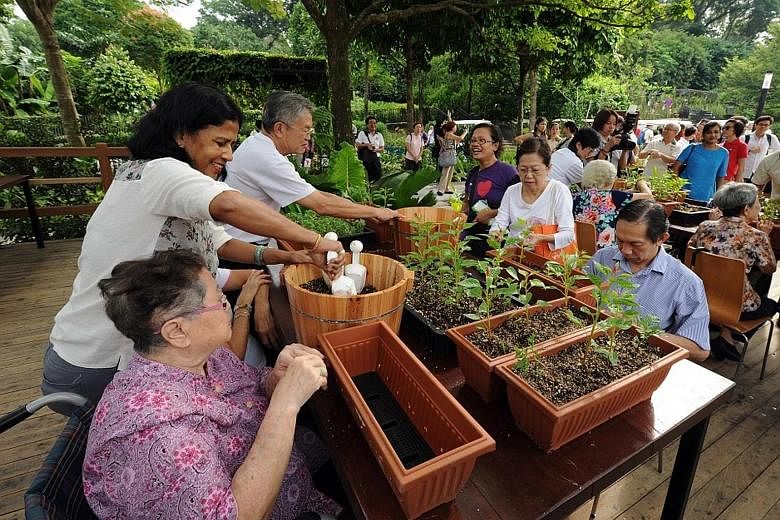Horticultural therapy - which encourages a person to visit green spaces and join guided group gardening activities - can have mental and physical health benefits.
This is the interim finding of an ongoing local study, called Effects Of Horticultural Therapy On Asian Elderly's Mental Health.
It was started last year and will wrap up by the end of this year.
The joint research by the National University Healthcare System (NUHS) and the National Parks Board (NParks) has 69 participants, aged between 60 and 85.
In the study, therapy sessions are conducted weekly for 12 weeks and then monthly for three months.
Participants visit different parks, such as the Chinese Garden, to do gardening and indoor activities such as making pressed flowers.
Interim findings showed that horticultural therapy improves the psychological well-being of seniors. The participants reported a greater satisfaction with life and felt more socially connected.
"The process of growing plants helps with training the frontal part of the brain, the part that allows us to plan and solve problems," said the study's principal investigator, Associate Professor Roger Ho, consultant psychiatrist at National University of Singapore's psychological medicine department.
"You have to decide how much water to add, for instance. And if the plant is not growing well and dies, the elderly learn to cope and start again.
"This further strengthens their resilience. The therapy is also good for their blood pressure as it involves walking," he said.
There is historical evidence of the benefits of horticultural therapy. It was first used about 200 years ago to help psychiatric patients.
In Britain, a report by The King's Fund health think-tank extolled the benefits of gardens and gardening on health, saying that these can improve physical health, mental health and well-being, to resilience and recovery from illness and palliative care
Mr Joseph Ng, senior occupational therapist at the Institute of Mental Health (IMH), concurred.
-
Gardening
... AS THERAPY
• It is a structured activity
• It focuses on achieving specific goals, such as improving motor skills. Simple gardening activities such as watering, weeding, trimming and potting can help develop a person's motor skills.
... AS A HOBBY
• It is usually unstructured
• It focuses on general well-being.
Source: Mr Joseph Ng, senior occupational therapist, Institute of Mental Health
He said: "Horticultural activities can positively affect an elderly person's cognition, physical health, psychological state, social interaction and connection with nature."
Horticultural therapy, however, is not just gardening.
"The difference between gardening as a hobby and horticultural therapy is that the latter is a guided group activity and you can interact with other people," said Prof Ho.
"There must also be enough plants for them to interact with."
So, the guide must be knowledgeable about plants and gardening.
Mr Ng said that group activity in a natural environment, the planning of gardening tasks, the need to get up and move about and being in contact with nature improve a person's mental well-being.
"Since it involves hands-on experience with nature, there is multi- sensory stimulation. One can also reap the benefits of exposure to sunshine and fresh air," he added.
Indeed, gardening is one of the main activities offered to long- staying elderly patients at IMH.
"Nurturing a plant and seeing it grow to bear flowers and fruit can lead to a sense of satisfaction and accomplishment," he said. "This, in turn, improves the patient's confidence, self-esteem and mood."
Singapore has a therapeutic garden that was developed in consultation with Professor Kua Ee Heok of NUHS, a mental health expert. This therapeutic garden at HortPark has different zones, including one fitted with soothing water features; one with a range of scented plants and a gardening area that is accessible to wheelchair users.
Two more of such gardens are expected to come up at Bishan-Ang Mo Kio Park and Tiong Bahru Park in the next few years.
NParks is working with the Alzheimer's Disease Association to develop and conduct customised therapeutic programmes at the therapeutic garden at HortPark.
"These programmes will benefit the community, including the elderly, and will be ready by year end," said Mr Ng Cheow Kheng, group director of horticulture and community gardening, NParks.
People can also start their own garden at home or join community gardens in their neighbourhood to reap the benefits of gardening, he added.


